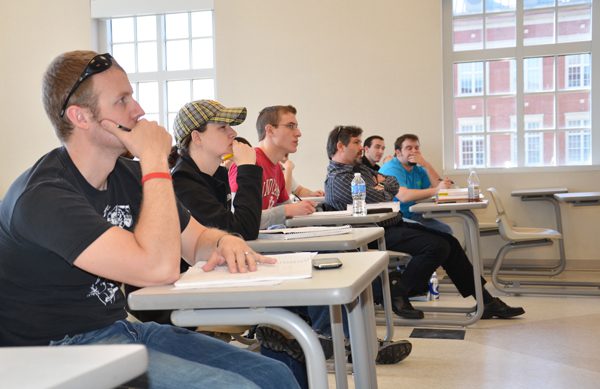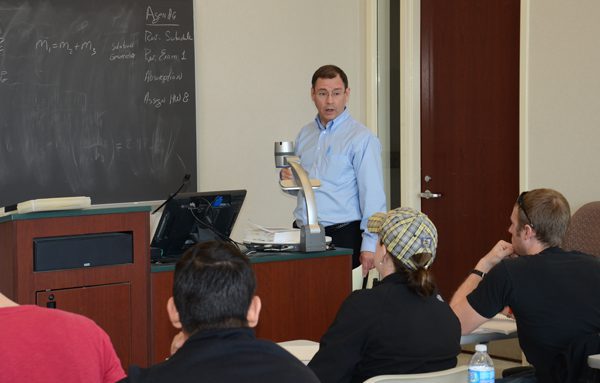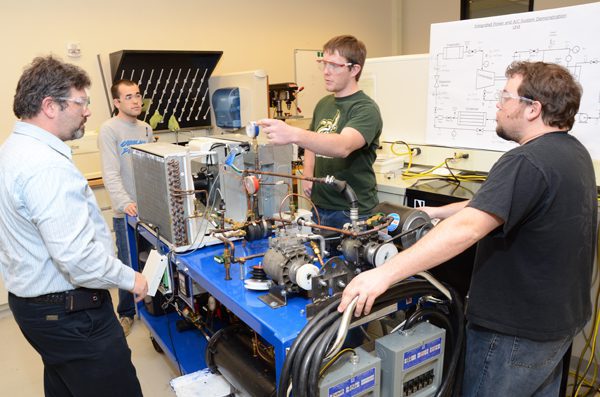New Energy Concentration in Mechanical Engineering

Developed with input from area industry professionals, a new concentration in energy engineering is strengthening the academic side of the Lee College of Engineering’s energy engineering programs, and giving mechanical engineering students the opportunity to focus their studies in the dynamic, growing field of energy.
Dr. Wilson teaching the Refrigeration and Air Conditioning class, which is one of the electives in the energy engineering concentration.
Now its third semester, the energy concentration is part of the Bachelor of Science in Mechanical Engineering degree program. The energy concentration had its first three graduates in December 2011, and there are currently 17 students enrolled in the program.
Working with energy industry representatives, ME faculty members Gary Wilson and Gloria Elliott created a new curriculum for the concentration. “It was interesting getting to know the industry people while developing the curriculum,” Dr. Wilson said. “We got to hear firsthand their wants and desires for energy engineering education. Because of this interaction, I think we will be one of the key places industry looks to for hiring energy engineers.”

The energy concentration begins in the second sophomore semester. Before applying, students must complete several Physics, Math and Mechanical Engineering courses with a grade of “C” or better and have an overall GPA of at least 3.0. When these requirements are completed they may take Energy Clinic I, a one-hour class that gives an introductory overview of the energy field. The class meets once a week and a number of the class sessions are led by area industry professionals.
Completion of the concentration includes taking four energy electives and doing an approved energy related senior design project. During the remainder of their engineering studies the students must maintain a 3.0 in all mechanical engineering courses.
A key component of the new curriculum is the energy related electives.. “We’re building the stable of approved energy electives,” Dr. Wilson said. “Most of the classes require a strong knowledge of thermodynamics, fluids and heat transfer, which is the basis of energy engineering.”
The energy technical electives include:
• Refrigeration and A/C
• Introduction to Finite Element Analysis
• Stationary Power Plant Systems
• Automotive Power Plants
• Introduction to Nuclear Engineering
• Sustainable Energy Production
• Turbomachinery
• Intermediate Fluid Mechanics and Vehicle Aerodynamics
Dr. Elliott is teaching the new class Sustainable Energy Production. “The class is based on the three pillars of sustainability, which are economy, society and environment,” she said. “We study the foundations of energy and then look at how these traditional theories are impacted by new approaches to generating energy. We consider all impacts of energy production including cost, politics, social perception, environmental impact and life cycle.”
The energy concentration is making sure students are exposed to the challenges that the energy industry is facing. This knowledge will be critical in the years ahead.
“The concentration is building a specific set of skills,” Dr. Elliott said. “It is a growing, dynamic experience for the students. They are learning how to apply mechanical engineering skills to energy problems.”
Chris Qualls is a senior in the energy concentration, “I love the thermal fluid stuff,” he said. “I was in the Navy for eight years on a submarine working with nuclear power. In the energy concentration, we’re doing a lot of design simulations and computer modeling of complete power systems. It’s interesting to change the variables and see the results.”
After graduation, Qualls plans to work on the thermal-efficiency side of the energy equation. “There are still a lot of gains to be made in everyday applications and stuff around the house,” he said. “I’m interested in the design side. I want to make processes and equipment better.”

Senior Stephen O’Flynn O’Brien is considering putting his energy concentration knowledge into practice in private industry or perhaps the Navy. “It will definitely be something in energy,” he said. “Energy is going to be one of the biggest challenges facing engineering in the next 50 years. Every industry that exists needs energy in some form. So, if know your thermal and fluids stuff, you’ll be valuable in all industry.”
Seniors in the energy concentration work on an integrated power and air conditioning project. The mobile unit can burn any type of material to generate electricity and drive an air conditioning system. Team members from left to right are Chris Qualls, Tyler McLaughlin, Stephen O’Flynn O’Brien and James Smith.